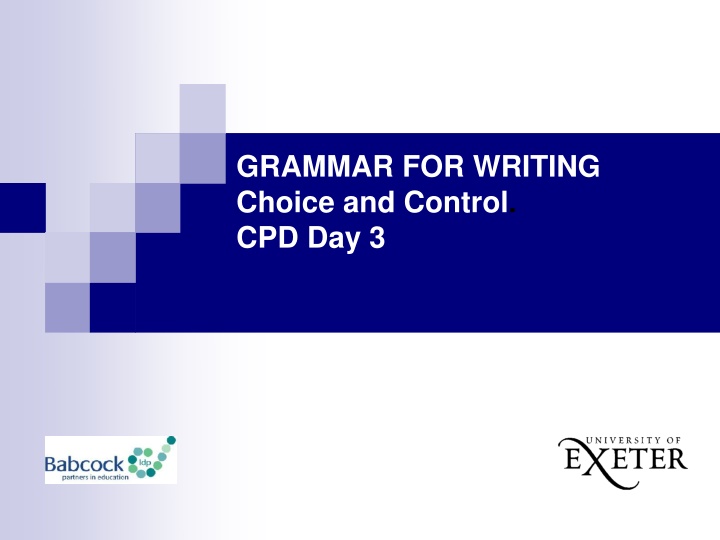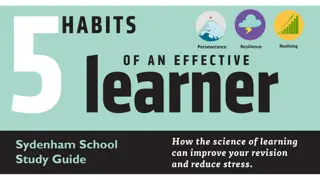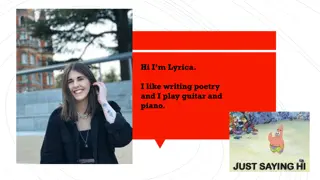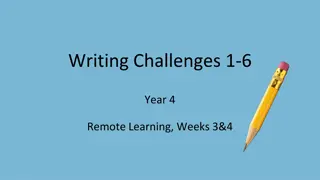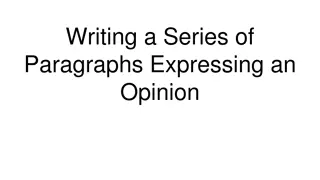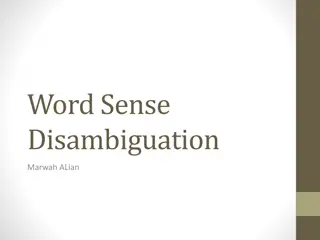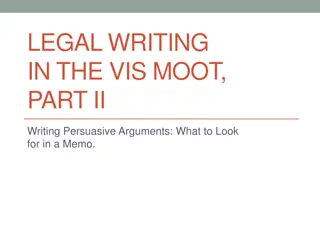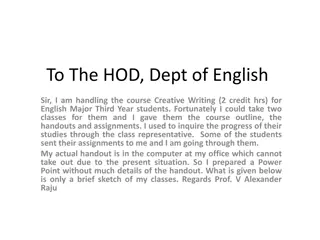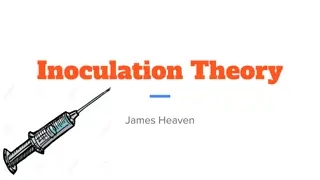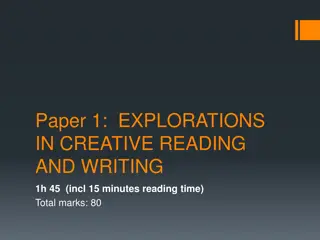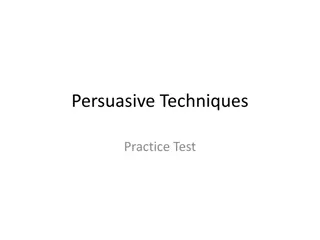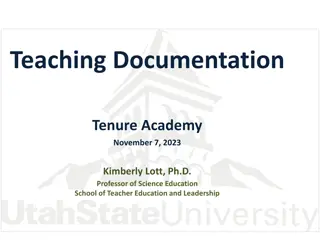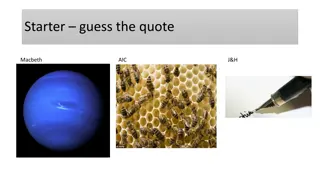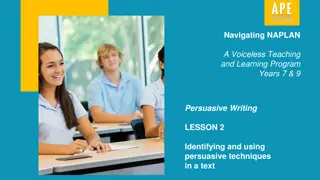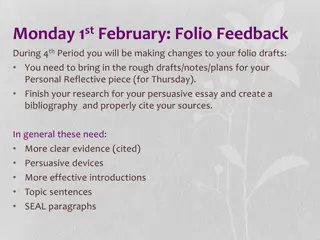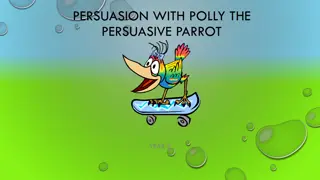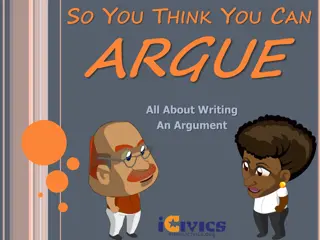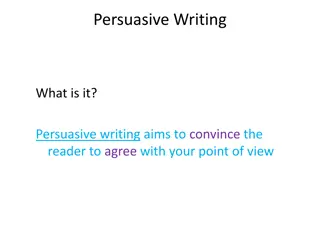Creative Teaching Approaches for Persuasive Writing Workshop
The workshop focuses on using Grammar for Writing principles to enhance teaching of persuasive writing, emphasizing modal verbs and adverbials. It encourages creative writing by engaging young writers' imaginations and beliefs, allowing freedom to explore ideas. Participants learn key teaching principles, such as linking grammar to writing, using examples, and fostering discussions. The session features a Persuasive Writing Scheme of Work on Food Waste, integrating real-life issues to inspire students' persuasive skills through collaboration and revision.
Download Presentation

Please find below an Image/Link to download the presentation.
The content on the website is provided AS IS for your information and personal use only. It may not be sold, licensed, or shared on other websites without obtaining consent from the author.If you encounter any issues during the download, it is possible that the publisher has removed the file from their server.
You are allowed to download the files provided on this website for personal or commercial use, subject to the condition that they are used lawfully. All files are the property of their respective owners.
The content on the website is provided AS IS for your information and personal use only. It may not be sold, licensed, or shared on other websites without obtaining consent from the author.
E N D
Presentation Transcript
GRAMMAR FOR WRITING Choice and Control. CPD Day 3
Aims of the day: To understand the teaching approaches in the persuasive writing SoW; To secure grammatical subject knowledge of modal verbs and adverbials; To support your own planning and teaching of writing informed by Grammar for Writing principles. 2
GfW: Four Key Teaching Principles Make a link between the grammar being introduced and how it works in the writing being taught; Explain the grammar through examples, not lengthy explanations; Use examples from authentic texts tolinks writers to the broader community of writers; Build in high-quality discussion about grammar and its effects. 3 3
Teaching Writing Creatively To write well we all need to have something to say and a desire to say it. Before young writers can meaningfully attend to how they have written something, they need to have engaged with what they want to say the ideas. Engaging young writers imaginations, emotions and personal beliefs is a really important part of teaching writing. Allowing young writers freedom to explore ideas, test things out, and to write to find out what they want to say is critical. We often move far too quickly to pinning things down, and making writing a very linear process we need to create space for exploration, experimentation and re-drafting. This is built into both of our Schemes of Work. 4
Teaching Writing Creatively Persuasive Writing Scheme of Work Food Waste: Can you Change the World? Real life issue: connecting persuasive writing with an issue which they can understand, and which can be extended in the local context. Content input: video and text information to ensure the children have the information to be persuasive with. On the Soapbox: practising written speech orally in an authentic persuasive context; generating confidence in public speaking. The Writing Process: gives space for idea generating, planning, outlining, drafting and revising throughout the scheme, with a particular emphasis on initial collaborative writing, then independent writing. 6
Food Waste: SoW Overview This scheme of work focuses on developing students awareness of the need to craft and shape a persuasive text. Through collaborative joint composition and collaborative revision, it supports students in learning about the writing process and how to plan and revise. The scheme draws attention to some characteristics of a persuasive text, developing students understanding of 3 core issues: Task awareness: Who is the reader? What is the purpose of the text? What are the writer s authorial intentions? Content: What do we need to know about the topic of food waste to create a persuasive text? Grammar and Language Choices: How are we going to write the text? 7
Food Waste: SoW Overview Grammar-Writing Links: Understanding how to create a persuasive argument through: Using clear statement sentences to make important points Using single clause sentences to draw attention to key points Choosing positioning vocabulary to indicate your point of view Choosing information, such as statistics, to support your point of view Using modal verbs to indicate different levels of assertion or possibility Choosing adverbs to reveal or emphasise your point of view Choosing connecting adverbials to link ideas across sentences 8
Writing Task What is the opinion you want to express? Who is the audience? Write a letter to your local paper arguing that so much food waste is wrong and suggesting what action we should take to reduce food waste. [No more than 300 words] What is the purpose of this task? What do you want to happen if someone reads your letter? How do you need to write this letter to be persuasive? What do you know about how to write letters? 9 9
Planning and Drafting What strategies do you use when you have to plan a piece of writing? making sure you know enough about the topic you have to write about thinking about the vocabulary you might need making sure you know what kind of writing you have to do gathering ideas for what to write about What strategies do you use when you are drafting a piece of text? pausing occasionally to re-read the text thinking ahead to where the text will end remembering what kind of writing you have to do thinking about your reader and how you want them to think or feel 10
Writing Together One pen: three heads! Collaborative writing is about using everyone in the group to compose a single piece of writing. You will need to: listen to each other s suggestions try out different possibilities for your writing make suggestions yourself discuss disagreements politely and thoughtfully (they are often the most interesting points!) 11
GRAMMAR SUBJECT KNOWLEDGE: Adverbials and modal verbs Using language devices to position the reader 12
Adverbs/Adverbials Subject Verb Object Adverbial Complement (adjective) / Complement (noun) Gregor ate bread greedily. Beauty s father was eating the extremely fresh bread. Gregor ate bread so greedily Surprisingly, Beauty s father was eating the freshly baked bread . 13 13
Activity in small groups Teachers demanding workload is growing. 14 14
A letter from the RSPB Look at the adverbs/adverbials identified in the text. What is each one trying to do? How do they position the reader? 15 15
Adverbs/adverbials: big ideas Adverbs/adverbials modify (almost everything) They provide additional information: Time Place Manner Reason Degree Some types link ideas across clauses, sentences or paragraphs (conjuncts and conjunctions) or comment on a whole clause or sentence (disjuncts) Adverbs/adverbials are often mobile within a sentence 16 16
They use vocabulary which emphasises the point of view. Being Persuasive These are all sentences from different reports on food waste. The writers have thought about how to be persuasive thinking about what they write and how they express it. With food bank visits at an all-time high, the amount supermarkets are throwing away is appalling. A survey reveals a staggering two thirds of some freshly bought food goes to waste. The average UK family is wasting nearly 60 a month by throwing away almost an entire meal a day. One third of all food produced in the world ends up as waste. The sentences are all clear statements which express the writer s point of view. 17
PERSUADING WITH ADVERBS and ADVERBIALS 18
Adverbs to show Point of View I'm passionate about making this happen because a few years ago I fell on hard luck myself. I lost my job through no fault of my own due to a chronic illness. My health would have improved immeasurably had I been able to afford fresh, healthy, fruit and vegetables. If a scheme whereby these life-giving items were available to me for free had been provided back then, I would have been spared the constant choice of eating properly or paying the ever-mounting bills. I was incredibly lucky that I had friends and family to bail me out and buy me a few groceries during the bleakest of times, but so many others are just not as fortunate. Now that I am well enough to support myself again, I don't want anyone else to experience the hell I went through. The food is THERE and it s perfectly good and nourishing. There are so many people who need it right now, despite what the government might try to make you believe. So what are we waiting for? France has already proven that this can work. So I m asking for Parliament to take this campaign seriously and rush through a change in the law as soon as possible, before anyone else in the UK starves needlessly. 19 19
Adverbials to Connect Ideas There are two main threads to my campaign. First of all, I believe that supermarkets should be legally obliged to hand over all unsold but still edible foods to various food distribution charities instead of it going straight to landfill. On top of this, supermarkets should also be encouraged to offer a service whereby customers can opt in for voluntary weekly donations (a small sum, around 2) when they buy their groceries online. In this paragraph the two adverbial phrases, First of all and On top of this , link back to the opening sentence and the two main threads . Thread 1 is introduced by First of all and thread 2 by On top of this . This helps to make the paragraph coherent and flow well. Have you noticed that this writer uses a short single clause sentence to introduce this paragraph? 20 20
Adverbials to connect Ideas After reading about the bill being passed in France to force supermarkets to give their unsold but still consumable food products to at least one food charity I decided that I d try to do something for us here in the UK. For, while we may be separated by the Channel, our problems with waste are very much the same. For example, two years ago Tesco announced that it had generated almost 30,000 tonnes of food waste over just six months. In light of the successful French campaign to cut waste, I started a petition in the UK hoping that it may eventually make it to a debate in Parliament. I needed to get 100,000 signatures for this to happen. It's now got over 150,000, and has been popping up all over the world, across the press and social media. There are two main threads to my campaign. First of all, I believe that supermarkets should be legally obliged to hand over all unsold but still edible foods to various food distribution charities instead of it going straight to landfill. On top of this, supermarkets should also be encouraged to offer a service whereby customers can opt in for voluntary weekly donations (a small sum, around 2) when they buy their groceries online. 21 21
Adverbials to Connect Ideas Some examples of other adverbial phrases which can connect ideas across sentences and across your writing: on the other hand despite this even so to sum up in contrast as a result for instance You might know some more? 22
Have your Say! Your chance to change the world! Make an argument expressing your opinion about food waste. Draft and rehearse to each other a 30 60 second soapbox speech (perhaps just four or five sentences), presenting your opinion on food waste, using positioning adverbs and some of the adverbial connectives to make it cohesive. 23
PERSUADING WITH MODAL VERBS 24
Modal Verbs shall, should, can, could, might, may, must, will, would (ought to) We ___________ open the door. 25
A letter from the RSPB Activity Find the modal verbs What is the effect on the reader? How are they used across the text? 26
Modal Verbs must can will may would shall should could might ought to loud You canhave chocolate after dinner. Turning up the volume: modal verbs can be used for gentle persuasion or strong persuasion, like turning up or turning down the volume on the television soft 27 27
Modal Verbs can could will would shall should may might must ought to they simply cannot make ends meet more could be done to reduce food waste Just imagine what it must be like supermarkets should also be encouraged to offer a service Delivery vans could then drop much needed perishables to people on the delivery route My health would have improved immeasurably I would have been spared France has already proven that this can work 28
Modal verbs: big ideas Type of auxiliary verb and help form verb phrases: We must act now; this can work Always placed first in a verb phrase, before other auxiliaries and before lexical verbs: how empty life would be; my health would have improved Express degrees of possibility and certainty (and therefore can be used to position a reader) Do not have an s form or non-finite forms (-ing, -ed, to - )29
Persuasive letter redraft: what has this student learned and applied? How successfully? Dear Madam Haigh I am writing to you about food waste and how it effects our planet. We live in a sersyety where food waste seems to be everywhere. A staggering 19% of the food bought by households is wasted. This must change! If 7.2 million tonnes of food is wasted each year then think about how much carbon dioxide is released into the atmosfear. 32
Revising Well Revising what you have written: the content:- How strong are the points you have made? How much detail or information have you given to support your argument? Revising how you have written it: the choices you have made:- How have you made your text persuasive? What language choices can you make to create a really persuasive text? Revising strategies: Reading and re-reading; crossing out words and phrases; writing new words or phrases in margins; using arrows to show where things need to move around; reading aloud to each other; trying out different choices Revising is messy! 33
TAKING THE PROJECT FORWARD
What we have learned Teachers and students have been strongly engaged by the teaching units; The power of imaginative engagement in Merlin unit it is easy to move so quickly to analysing text or talking about success criteria that young writers have no time to engage with ideas and purpose. But imaginative engagement is key. Strong take-up of the idea of linking grammar with making meaning in writing; Some schools reporting strong improvement in writing; Some schools have planned whole school or whole academy roll-out of this project. 35
What we have learned Some development points to consider: Verbalising more clearly the effect of a particular grammatical choice: being sure you can articulate the effect yourself, perhaps in your planning, until it becomes more natural; modelling this kind of language talk for children; creating tasks which give children opportunities to verbalise their understanding of the effect of a particular choice; displaying visually examples of expressing the effect; giving formative feedback where you articulate the effect of a child s choice for them. 36
Have a go! Late one evening, in a cave of soft mosses high in the mountains where the air was thin and stars sparkled in sky and snow, the Child took the great leopard s head in her hands. The Snow Leopard licked the Child s cold face, rough cat tongue against soft skin, purring her final spirit song. And as she licked, Child became Leopard, thick-furred and wild-eyed, mottled like shadows, spirit cat. As the old Leopard finished her song she leapt from the mountain into the star-filled sky, her dappled coat blending with the stars of the Milky Way, and her song changed to a whisper of starlight. And back in the mountains, the young Snow Leopard looked up at the stars mirrored in her blue cat s eyes, heard the whisper and began a new song. 37
What we have learned Some development points to consider: Creating classrooms where children talk about language choices: group or paired talk tasks discussing different versions of a text or different choices; inviting children to explain the choices they have made in their own writing and why they think they are effective; using whole class discussion to generate real enquiry about language and its possibilities leading a discussion drawing on your expertise but not directed towards a single right answer; naming the effect of a particular choice is not right/wrong but an interpretation, just as in literary interpretation 38
Have a go! On Saturday, he ate through one piece of chocolate cake, one ice-cream cone, one pickle, one slice of Swiss cheese, one slice of salami, one lollipop, one piece of cherry pie, one sausage, one cupcake, and one slice of watermelon. The Very Hungry Caterpillar Eric Carle Then Mr Gumpy and the goat and the calf and the chickens and the sheep and the pig and the dog and the cat and the rabbit and the children all swam to the bank and climbed out to dry in the sun. Mr Gumpy s Outing John Burningham Why do you think Eric Carle chooses to use commas to separate his long list of noun phrases and John Burningham chooses to use and ? 39
What we have learned Teaching grammar purposefully requires strong subject knowledge: Understanding the grammatical concepts yourself; Knowing how to teach grammatical concepts; Knowing how to make links between a grammatical feature and its possible effects in writing Knowing how and when to intervene to improve students writing Knowing what to look for as evidence of transfer of learning into students writing, and to focus feedback 40
The Long Walk: consolidating grammar subject knowledge Choosing texts that engage the imagination or stimulate ideas Identifying how effects have been created grammatically to focus the grammar teaching Planning grammar activities which will support children s understanding and independent application when creating their own texts 41 41
Read the text and decide what is important about it. Which sections would you choose to focus on and what does the writer do grammatically to create the effects? Which specific parts would you use as examples? What sequence of activities might you do? 42 42
The Long Walk From The Fib and Other Stories by George Layton Read the story What is really important about this text? 43 43
Writerly Knowledge Charts Noticing the impact or effect of the text Identifying how those effects have been created by the writing Noting specific examples 44 44
Planning a sequence of grammar activities that includes: Noticing, exploring and discussing the effect of the grammar in the text Learning about and playing with the construction Practising, discussing and evaluating the effect Applying independently to create meaning 45 45
Planning a sequence of grammar activities Identifying words and phrases that create effects in texts text marking Card sorting and classifying Using cards to manipulate parts of sentences to create different effects controlled to freer experimentation Using a picture to create a phrase and then prompt cards to transform the meaning/mood Using a chart to generate phrases/clauses and then manipulating them to create different meanings Using a picture to practise/apply new knowledge Direct instruction about the form of a grammatical element Using a film clip to apply film techniques to writing Experimenting with sentences: adding words/substituting words/ deconstructing sentences
GfW: Four Key Teaching Principles Make a link between the grammar being introduced and how it works in the writing being taught; Explain the grammar through examples, not lengthy explanations; Use examples from authentic texts tolinks writers to the broader community of writers. Build in high-quality discussion about grammar and its effects. 47
Grammar Subject Knowledge The project has tried to support you in developing and strengthening grammar knowledge; This is a journey that all of us are still travelling on, the project team included! Our current research is showing how important teachers grammar knowledge is in helping students understand grammatical concepts and understand how language is working. Task: Reflect on and evaluate what you have learned and have still to learn. 49
Project Website http://socialsciences.exeter.ac.uk/education/research/centr es/centreforresearchinwriting/projects/grammarforwriting/co mparisonteachers/ Username: Lancelot Password: Avalon 50
